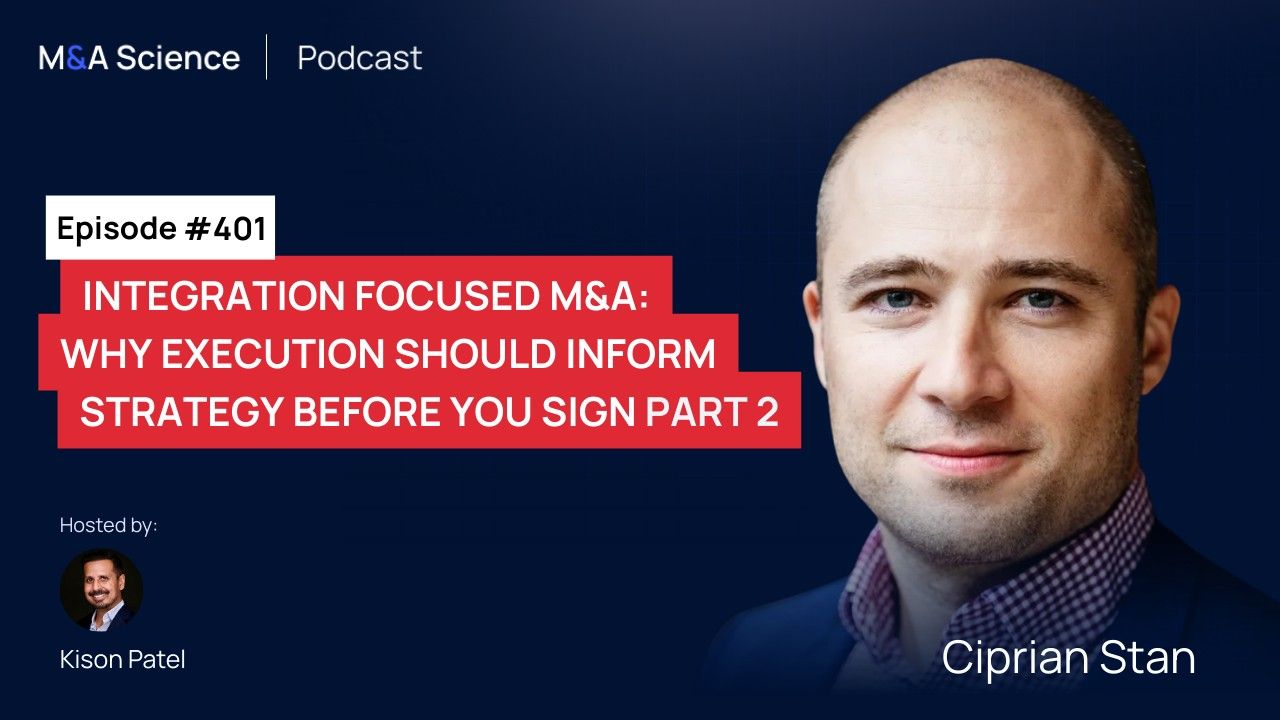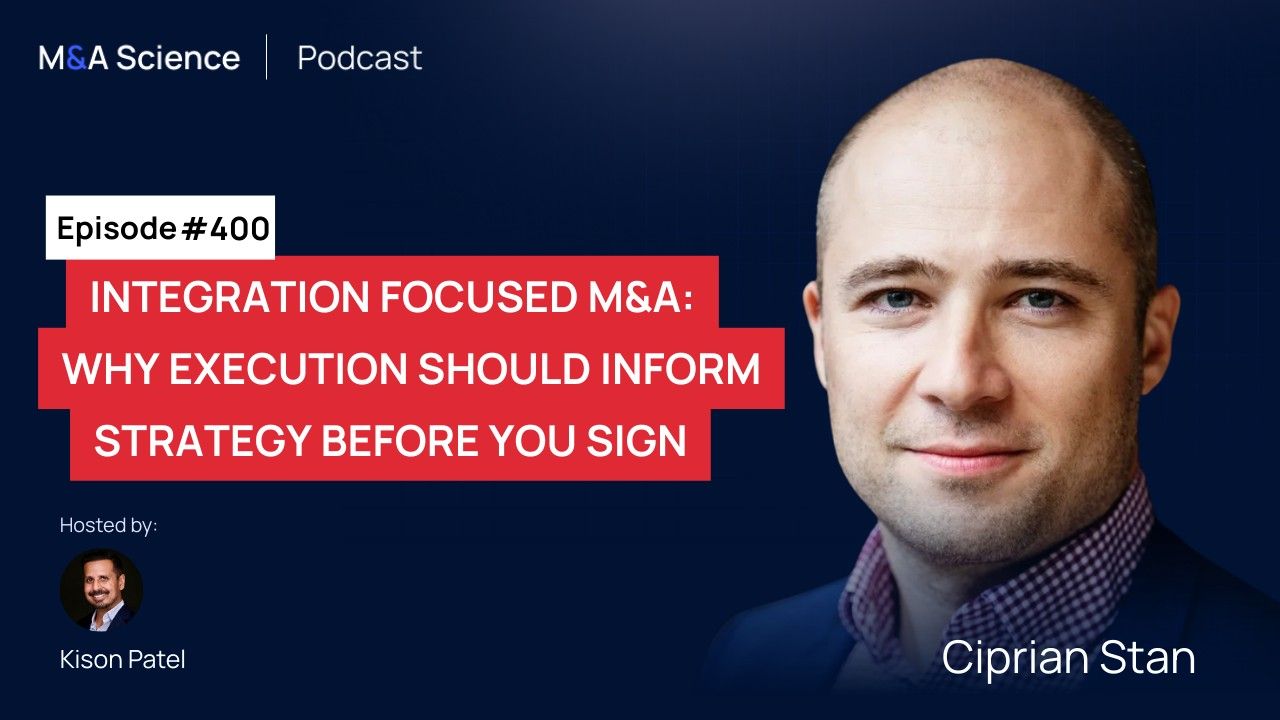.webp)
Jordan Lampos
Episode Transcript
Text Version of the Interview
Largest Sell-Side M&A Challenges
While challenges and issues vary greatly from deal-to-deal, Jordan that most problems areas revolve around financial statements for those on the sell-side. Preparing, reviewing and documenting everything for due diligence can be very taxing on organizations.
When to Start Preparing for an Acquisition
From start to finish, the acquisition process is incredibly taxing and time-consuming. While there is no set time of when to actually begin preparing for the deal, Jordan recommends the earlier, the better.
Those Involved with Preparing Due Diligence Material
Parties involved in preparing due diligence material can vary among transactions. Generally, a financial advisor, attorney, and internal management team engage in the process.
Selecting an Investment Bank
Jordan believes that key factors for selecting an investment bank boil down to industry expertise and personality fit with the advisors. You want someone who is familiar with industry trends, drivers, and key metrics that your business may encounter.
You can look at an investment bank’s transaction history and call references to get a better feel for their strategy.
Steps Taken After Signing a Mandate
Once the client officially signs, the first step Jordan’s team typically takes is providing the client with a comprehensive due diligence request list that contains a variety of financial and non-financial contractual items. This is then logged in to a virtual data room, but the key is to organize the information received into data.
Challenges Faced While Collecting Diligence Material
Jordan assesses that one of the major hurdles for managers is tracking the due diligence requests in the data room throughout the process. From his experience, he found that using DealRoom’s due diligence tool is crucial. DealRoom allows teams to stop trading outdated Excel documents, bolsters collaboration, and efficiently run through high priority items.
The Timeline for Selling a Company
While each M&A process should be tailored to the transaction at hand, there is a similar timeline for most deals.
After you initially launch, you typically spend four to six weeks distributing the executive summary to potential buyers signing the non-disclosure agreement (NDA). Then, you prepare and send out the confidential information memorandum (CIM), which is a fairly comprehensive document that details everything that someone would need to know about the company.
Jordan gives potential buyers four to six weeks to review the information. Then the teams sends out indications of interest, which tend to be non-binding letters that detail a range of what the buyer could potentially pay for the asset.
From there, you select a handful of groups based on various criteria and move into management presentations.
At this point, you will typically open a data room buyers to do business due diligence. At the end of that period, which takes another four weeks or more, you would call for letters of intent (LOI). LOIs grant a degree of exclusivity to one buyer that you would ultimately select to go through the confirmatory due diligence process and then close the transaction.
To summarize, Jordan exclaims that once you launch into the market, you have four to six weeks of the marketing period, four to six weeks of manager meetings and due diligence, and thirty to ninety days for the closing period.
Combating Deal Fatigue at the Target Company
There are a number of factors that make deals challenging. Some of it is simply the personalities of the counterparties, the buyer and seller. Deal after deal, the depth and complexity of diligence consistently proves to be a challenge for management. Many of the issues of due diligence come down to the sophistication of the seller.
Jordan’s team works with a lot of small middle-market companies that are entrepreneur-owned. While they are great businesses, usually growing fairly rapidly, they are not accustomed to having all of the internal resources of a large publicly traded company. What you often see here are employees wearing multiple hats and filling a range of duties, so a lot of the burden falls on them.
On the other hand, you want to focus on really being efficient with everyone’s time, especially everyone on the management team. We always want to focus on trying to allow the management team to run the business, maintain performance, continue to grow, focus on clients, focus on revenue and profitability. If a management team gets too distracted during an M&A process, it could derail the business. And if the business derails, it's most likely that the transaction will be derailed. So you have to walk a very fine line between overburdening the management team, but also if they don't spend enough time and effort on the transaction, the transaction probably won't get done for those reasons as well. It can be a it can be a challenging process to navigate, which is why a good attorney and a good financial adviser are worth the investment.
Largest Benefits of Using an Investment Bank
Jordan regards the largest benefit to using an investment bank is being able to leverage an investment banker or financial advisor. They help by working on the transaction, which allows the manager to actually invest time in managing the business.
Investment banks also give five to ten buyers or a broad universe of financial sponsors, versus spending a substantial amount of time, energy, and money on the marketing stage of the deal.
Additionally, investment banks create a competitive dynamic that may result in you receiving the highest possible price in the market for your assets.
Leveraging Technology for Better Results
Jordan recommends utilizing technology such as online data rooms, such as DealRoom, because their clean, intuitive interface. This especially applies to the due diligence tool because it allows you to manage multiple work streams at a time. Teams can collaborate by uploading documents, asking questions, and adding comments.
How Project Management Tools Benefit the Seller
The Duff & Phelps team assesses that project management tools also equip the seller for a smoother transaction. Processes are bolsters because requests are in one place and they are handled digitally versus an Excel file with a dozen strange, non uniform tabs that is passed between parties. With DealRoom's mergers and acquisitions software, you can seamlessly manage all of the facets of due diligence in one shared space.
It's easy to take a request that you have uploaded into DealRoom into the request section and link it to the appropriate document in the deal room. Then, you always have that connection between the request and the document. Sending off or referencing different indexes on an Excel spreadsheet tends to be an error prone process where you can you can put in the wrong reference or cells could get deleted.
The Future Role of Technology in Investment Banking
Jordan forecasts that technology is going to continue to speed up processes, improve time, and improve outcomes for both buyers and sellers. Overall, groups will be completing deals faster, which will result in reduced fees from advisors and productivity loss.
Advice for Acquisitions
As for acquisitions, Jordan mainly recommends being organized and on top of documentation, insurance, finances -- everything. Good organizational skills will help you be efficient in finding and uploading the proper documents. Sometimes this also requires investing in the proper tools.
M&A Software for optimizing the M&A lifecycle- pipeline to diligence to integration
Explore dealroom

Want to wear your M&A expertise?
Check out the M&A Science store.




.jpeg)
